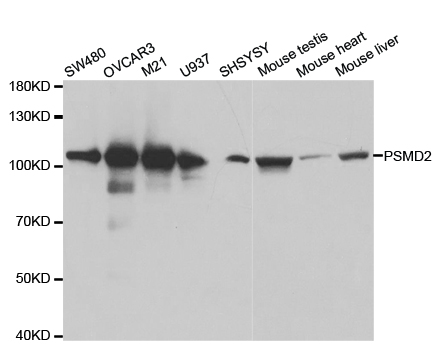PSMD2 Rabbit Polyclonal Antibody
Frequently bought together (3)
Recombinant protein of human proteasome (prosome, macropain) 26S subunit, non-ATPase, 2 (PSMD2)
USD 823.00
Transient overexpression lysate of proteasome (prosome, macropain) 26S subunit, non-ATPase, 2 (PSMD2)
USD 396.00
Other products for "PSMD2"
Specifications
| Product Data | |
| Applications | ICC/IF, WB |
| Recommended Dilution | WB 1:500 - 1:2000;IF 1:50- 1:200 |
| Reactivities | Human, Mouse |
| Host | Rabbit |
| Isotype | IgG |
| Clonality | Polyclonal |
| Immunogen | Recombinant protein of human PSMD2 |
| Formulation | Store at -20°C (regular) and -80°C (long term). Avoid freeze / thaw cycles. Buffer: PBS with 0.02% sodium azide, 50% glycerol, pH7.3. |
| Concentration | lot specific |
| Purification | Affinity purification |
| Conjugation | Unconjugated |
| Storage | Store at -20°C as received. |
| Stability | Stable for 12 months from date of receipt. |
| Predicted Protein Size | 908 |
| Gene Name | proteasome 26S subunit, non-ATPase 2 |
| Database Link | |
| Background | The 26S proteasome is a multicatalytic proteinase complex with a highly ordered structure composed of 2 complexes, a 20S core and a 19S regulator. The 20S core is composed of 4 rings of 28 non-identical subunits; 2 rings are composed of 7 alpha subunits and 2 rings are composed of 7 beta subunits. The 19S regulator is composed of a base, which contains 6 ATPase subunits and 2 non-ATPase subunits, and a lid, which contains up to 10 non-ATPase subunits. Proteasomes are distributed throughout eukaryotic cells at a high concentration and cleave peptides in an ATP/ubiquitin-dependent process in a non-lysosomal pathway. An essential function of a modified proteasome, the immunoproteasome, is the processing of class I MHC peptides. This gene encodes one of the non-ATPase subunits of the 19S regulator lid. In addition to participation in proteasome function, this subunit may also participate in the TNF signalling pathway since it interacts with the tumor necrosis factor type 1 receptor. A pseudogene has been identified on chromosome 1. Alternative splicing results in multiple transcript variants of this gene. |
| Synonyms | P97; RPN1; S2; TRAP2 |
| Reference Data | |
| Protein Families | Druggable Genome |
| Protein Pathways | Proteasome |
Documents
| Product Manuals |
| FAQs |
| SDS |
{0} Product Review(s)
0 Product Review(s)
Submit review
Be the first one to submit a review
Product Citations
*Delivery time may vary from web posted schedule. Occasional delays may occur due to unforeseen
complexities in the preparation of your product. International customers may expect an additional 1-2 weeks
in shipping.






























































































































































































































































 Germany
Germany
 Japan
Japan
 United Kingdom
United Kingdom
 China
China




